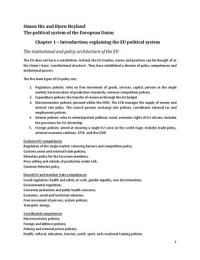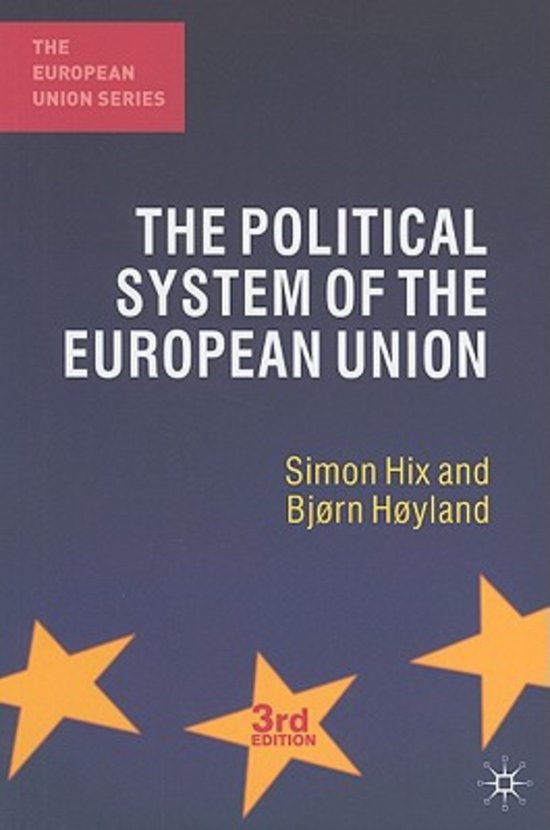Simon Hix and Bjorn Hoyland
The political system of the European Union
Chapter 1 – Introduction: explaining the EU political system
The institutional and policy architecture of the EU
The EU does not have a constitution. Instead, the EU treaties, norms and practices can be thought of as
the Union’s basic ‘constitutional structure’. They have established a division of policy competences and
institutional powers.
The five main types of EU policy are:
1. Regulatory policies: rules on free movement of goods, services, capital, persons in the single
market; harmonization of production standards; common competition policies.
2. Expenditure policies: the transfer of resources through the EU budget.
3. Macroeconomic policies: pursued within the EMU. The ECB manages the supply of money and
interest rate policy. The council pursues exchange rate policies, coordinates national tax and
employment policies.
4. Interior policies: rules to extend/protect political, social, economic rights of EU citizens. Includes
the provisions for EU citizenship.
5. Foreign policies: aimed at ensuring a single EU voice on the world stage. Includes trade policy,
external economic relations, CFSP, and the ESDP.
Exclusive EU competences
Regulation of the single market: removing barriers and competition policy;
Customs union and external trade policies;
Monetary policy for the Eurozone members;
Price setting and subsidy of production under CAP;
Common fisheries policy.
Shared EU and member state competences
Social regulation: health and safety at work, gender equality, non-discrimination;
Environmental regulation;
Consumer protection and public health concerns;
Economic, social and territorial cohesion;
Free movement of persons, asylum policies;
Transport, energy.
Coordinated competences
Macroeconomic policies;
Foreign and defense policies;
Policing and criminal justice policies;
Health, cultural, education, tourism, youth, sport, and vocational training policies.
1
,Exclusive member state competences
all other policy areas: most areas of taxation and public spending.
There are two main types of intermediate associations that connect the public to the EU policy process:
Political parties: the central political organizations in all modern democratic systems. Political parties
have influence on each of the EU institutions. The winners of national elections are represented in the
council. European Commissioners owe their position to support and nomination by national party
leaders. MEPs are directly elected every five years.
Interest groups: voluntary associations of individual citizens. For example trade unions or consumer
groups. National interest groups lobby at national governments or approach the EU institutions directly.
Like-minded interest groups join forces in order to lobby commission, council working groups, or MEPs.
Interest groups fund political parties in order to represent their views in national/EU politics.
During the process of European integration, every subsequent set of treaty reforms has been less
ambitious than the previous one. This is because the EU has gradually gotten closer to a ‘constitutional
equilibrium’
What is the EU? A political system but not a state
Almond and Easton defined a political system as having four characteristics: Stable and clearly defined
set of institutions for collective decision-making; citizens seek to realize political desires through the
political system; collective decisions in the political system have impact on the distribution of economic
resources; continuous interaction between political outputs. The EU possesses all these characteristics.
It does not, however, have a monopoly on the legitimate use of coercion, thus it is not a state in the
traditional Weberian definition. The EU political system is highly decentralized, based on the voluntary
commitment of member states, and relies on sub-organizations to administer state power.
Two theories of EU politics
Intergovernmentalism: EU politics is dominated by member state governments, especially the ‘big three’
of Britain, France, and Germany. Member states have clear preferences of what they want to achieve at
the EU level.
Andrew Moravcsik’s liberal intergovernmentalism explains member states preferences as varying across
policy areas and over time. Governments have substantial resources at their disposal, and are well
informed about the positions of other actors.
The main proposition of intergovernmentalism is that member states are careful with what they
delegate to the Commission, the EP and the ECJ. The governments act as ‘agents’ of the EU by carefully
delegating to the institutions only those issues that further the collective interest of the governments.
Another proposition is that every state on average gains from the European integration process.
2
, Supra-national politics: encompasses a wide variety of approaches, which share the central proposition
that the governments of the member states are not able to shape the EU according to their wishes.
There are three interrelated reasons for this: Supranational institutions are not simply passive agents of
the government, and have their own interests, preferences, resources and power; the rules governing
policy-making in the EU institutions shape policy outcomes, and not always in a way that governments
can predict (e.g. QMV); Actors’ interests in shaping policy might sometimes better be captured by the
‘left-right’ dimension of politics than by that of ‘national sovereignty vs European integration’.
Putting these three principles together, the key point of the supra-national politics framework is that EU
policy outcomes might turn out differently from the original intentions of governments.
A proposition derived from supra-national politics approach is that of the EU’s democratic deficit,
originating from the fact that governments have delegated powers to the European level and policy-
making in Brussels has become isolated from national public opinion and parliaments.
Intergovernmentalism disputes this proposition, arguing that there is a close connection between
preferences of citizens and EU policy outcomes, because national governments, who are elected by
citizens, are in fact running the EU.
Chapter 2 – Executive politics
Theories of executive politics
Modern governments have twofold powers: political and administrative. The EU divides these powers
between different actors and bodies. In the principal-agent framework, the initial holder of executive
power (principal) decides to delegate tasks to body responsible for carrying out the task (agent). The
principal has to ensure that the agent executes the task in a neutral manner. The agent is under three
pressures to shape policy in a certain manner: lobbying; bureaucratic oversupply; bureaucratic
independence. The principal can prevent this by selecting or controlling an agent. It is faced with
choosing an agent with similar interests, or one that is highly competent.
One consequence of the principal-agent model in a collective body is policy drift. The agent is able to
pull policy towards its own ideal point. It is able to do this up to a point upon which the majority of
governments still agree. This majority will then block any attempt to move the policy further from the
agent’s ideal point.
Principals are able to control policy drift by implementing monitoring devices, or specifying the
delegated task. Another option for the principal is to rely on control by affected parties such as interest
groups.
Franchino amended the principal-agent framework to apply to the dual-executive nature of the EU.
Legislators can rely on two agents to implement EU legislation: the Commission and national
bureaucracies. The decision between the two is based on the trade-off between policy drift by the
3






